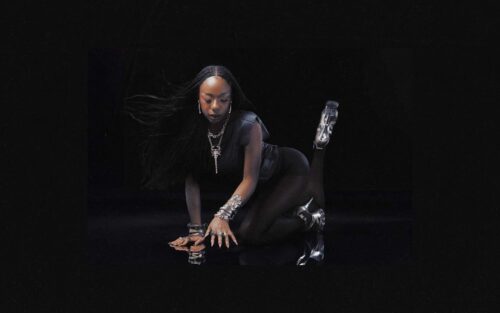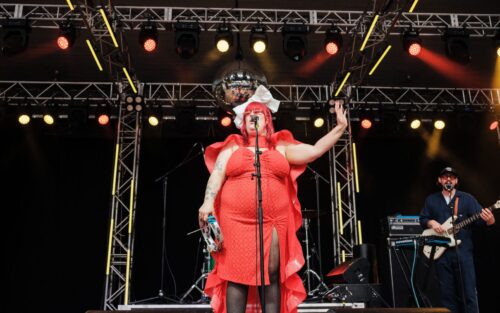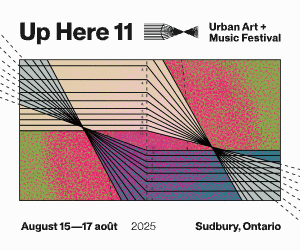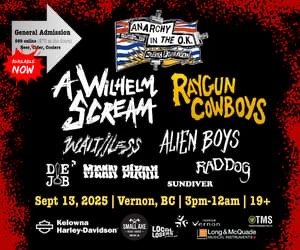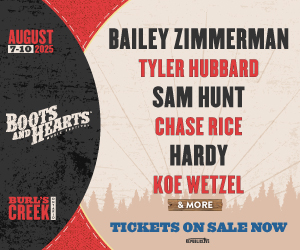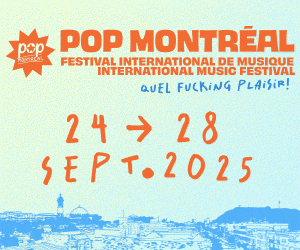Bodywash Come Clean on I Held the Shape While I Could
The Montreal dream-pop duo find hope in a harsher edge on their sophomore album.
By Daniel McIntosh
Photos by Kristina Pedersen
- Published on
“I think that the record for us is very much about dislocation and disorientation and losing the things that you were counting on for your future and the things that you were building your sense of stability around,” says Long Decter.
Over the frenetic riff of “Massif Central,” Steward parses the experience of being rejected from citizenship status on account of a bureaucratic mistake, a single typo. The coarse guitars animate the reality of being in an existence-defining liminal space, while Steward searingly addresses the situation: “did i slip between the hands that feed me?” The duo probes into the nature of home, whether it’s through texturally varied synths and crushing guitars or reeling out into ambient territory on tracks like “Bas Relief.”
Besides having a poignant and thought-provoking album in I Held the Shape, it definitely helps that they absolutely shred. RANGE caught up with Bodywash in the midst of their tour to talk about songwriting, touring, and the perceived separation of artists and critics.
Hello, Bodywash! How is the tour going? Have you guys played in these cities before?
Rosie Long Decter: No, this is totally new territory for us. We’ve never been out west before. So it’s been really cool just to see new places. We’re both seeing Portland and Seattle for the first time.
Chris Steward: And Boise, ID.
RLD: And Boise! We just did Treefort Music Fest in Boise. Which is such a cool festival, such a great blend of community and artist-oriented but still big enough that you can see tons of bands you’ve always wanted to see. It was a really great festival.
You guys just released your second album, I Held the Shape While I Could, in the midst of this tour. Can you tell me about the inspiration behind “Massif Central”?
CS: That was written during a time in my life where, honestly, nothing was moving at all. I was just stuck in one place physically and mentally because of a typo made on one of my government work permits. That meant that I couldn’t work, I wasn’t legally welcome for a little bit in Canada. So there wasn’t much I could do. I just found myself wasting away. That was really a song that was written to represent that stasis, that feeling that I had at that time, and the music kind of reflects that lyrically. It kind of reflects that. And now when we’re playing it live, our guitarist Micah, he just screams every time the pre-chorus hits. And I felt like that’s a pretty apt summary of what that song is all about.
RLD: It’s not a happy record.
CS: Not a happy record, and that’s not a happy song, at all.


Rosie, on your end, I understand that you wrote “No Repair.” I find that the outro in your writing is a little more hopeful. I want to know if that’s intentional between you two, or if you guys bring that out of each other naturally.
RLD: I feel like I’m maybe a more optimistic person than Chris, am I justified in saying that?
CS: I think the difference is more that “No Repair” was written a little while after a traumatic event. I was in the traumatic event, that’s a prospective-based [thing]. But yeah, generally, Rosie is a little bit more optimistic than me, which isn’t super difficult.
RLD: I feel like in my art, I’m always trying to write towards hope. But, Chris makes a good point that “No Repair” was started… I started writing it a year after the difficult thing that it was about, and that distance is definitely important. And I think there’s a sense of acceptance that comes through in it as well.
CS: If I wrote “Massif Central” now it would basically be a karaoke song.
After that situation was sorted, which I hope it was, what did that feel like?
CS: It was an immediate catharsis, a crushing relief. I’m a permanent resident in Canada now, so I feel a lot more settled. I think really it was just this feeling of… I’m from the UK, I’m not sure I consider that my home now, because I haven’t really been back for a meaningful length of time in a while. I’d just moved in 2019 to Berlin, and then moved back to Montreal. So I really didn’t have much of a concept of a home. At that point, Montreal was kind of the closest thing to it, just because I’ve lived here for a while. All my friends are from here, at this point, or most of my friends are from here. So, to feel kind of rejected by that homeland was a bit of a blow. And so I think now that things are settled, I feel I feel a lot more settled as a result.
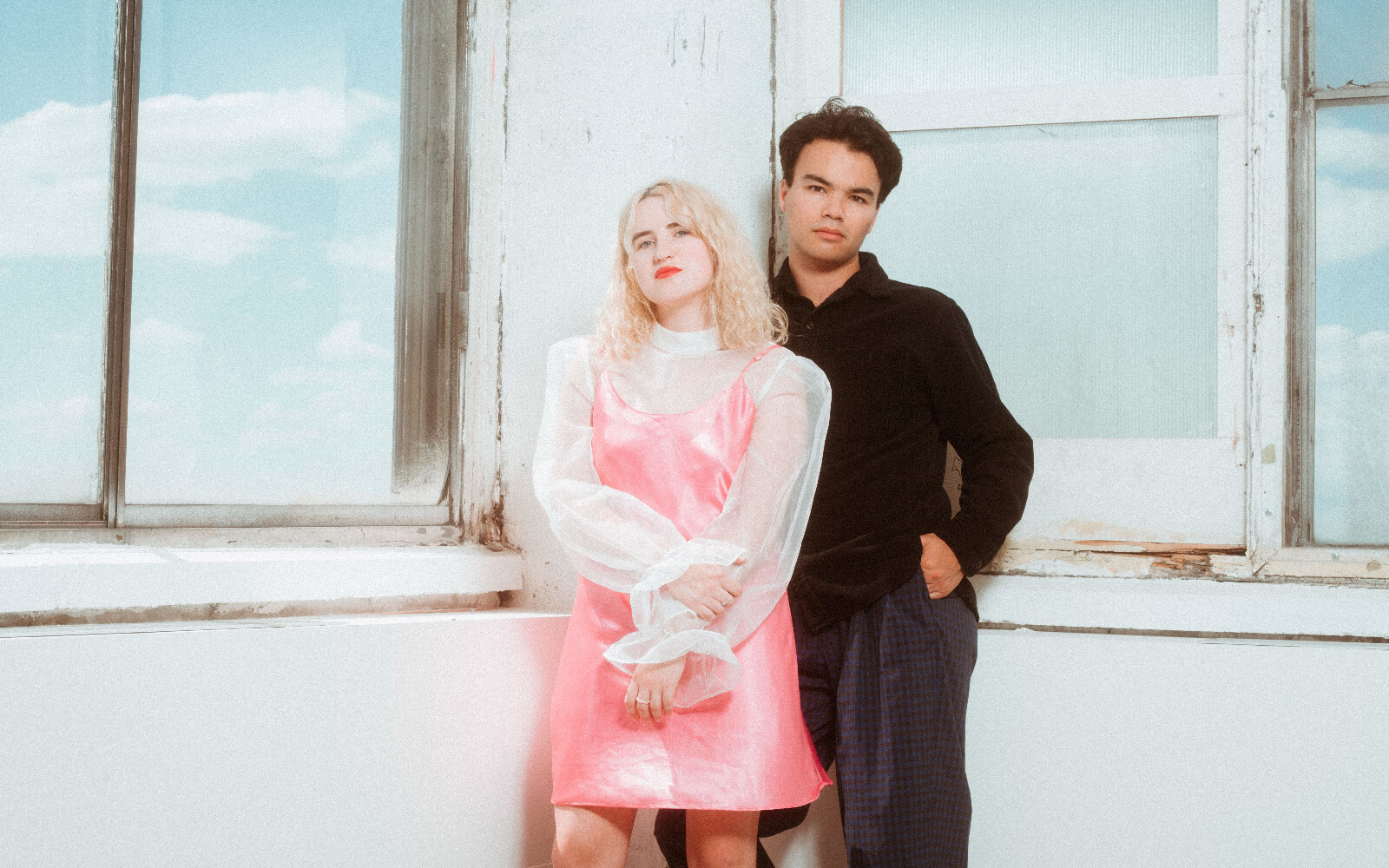
On the production side of things, I was looking at the liner notes of I Held the Shape on Bandcamp. I see you both produce everything, either individually or together. In terms of that process, are you guys just doing your own little snippets on the side and then filling out each other’s? How do you manage recording in two different places?
RLD: Chris is more of a producer than I am for sure. And you’ll notice that his name crops up a little more in the credits than mine. But when we’re writing, we both like to be in our own space alone and come up with the ideas in the sounds, and then we’ll send things back and forth. So a lot of the ones that are co-produced between us are ones that either I came up with the bare bones of and then would send to Chris, and he would flesh out the arrangements. Or alternatively, Chris would come up with the bulk of the sound on his own, and then send it to me, and I would figure out the synth sound for this section or add a chord change for the next section or things like that.
In terms of that songwriting, how has the experience of making this record changed your songwriting or moved it forward?
CS: We wanted this album to be a real showcase of what we can do, songwriting-wise. So I don’t know, harmonically. I think there’s a lot of interesting stuff going on here.
RLD: And stylistically, too. I do have anticipatory fears of people writing about the album and being like, ‘It’s all over the place. It’s not cohesive, it doesn’t make sense.’ My hope is that it kind of touches on these different styles and has the throughline of our essence and our core sensibility that runs through all of it.
It’s interesting that you touch on people writing about the album, Rosie, because I know you also work in music journalism. I don’t know if you consider yourself a critic, a writer, or a journalist, but there’s the timeless perceived separation between artists and critics. And I’m curious how you feel about that.
RLD: I think it’s definitely perceived because I think there are more people who do both and go back and forth than are generally acknowledged. Someone who comes to mind is JJ Skolnik at Bandcamp, who’s writing and is then also very involved in making punk music. I think there’s a lot of music writers who are totally involved in their local scenes and making music and making stuff happen.
If you follow the discourse on Twitter, every few weeks, some musician will come out like, ‘Music criticism is bad, music writers don’t get what artists are doing. And we do it for the fans.’ And I think, I don’t know, there’s an unfortunate perceived antagonism between the two, when to me, the job of a music critic is to add meaning and depth and provide an interpretive framework for the art. And when you’re an artist, and you read something by someone who totally seems to get what you’re going for, I think that’s a really powerful feeling. Which is not to say that critics should write for the artists, it’s important to be independent as a critic, but I think that there’s also a symbiosis that can happen between the two In an ideal situation.
I’ve also read reviews with criticism in them of our work, and that makes me reflect on what we’re doing. And something I take forward in a positive and constructive way. So I think that the two really feed each other.
More than people would see from the general division.
RLD: Totally. I mean, the only people who benefit from the kind of antagonism between music writers and artists are big business in music, who are trying to just draw eyes away from the fact that no one is getting paid. Writers aren’t getting paid, musicians aren’t getting paid. So we’re not enemies.
By Ben Boddez
The Toronto genre-bender speaks on shining brightly while not flying too close to the sun.
By Sebastian Buzzalino
Calgary’s beloved summer festival trudges through the downpour with a stacked lineup of genre-bending greatness.


